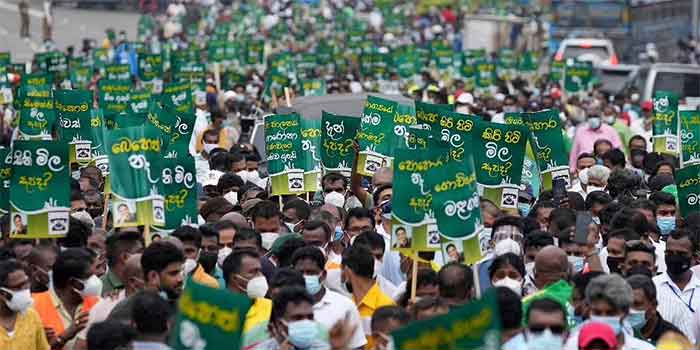
Tens of thousands of supporters of Sri Lanka’s main opposition party rallied in the capital Colombo to protest the nation’s economic woes.
This is the first major campaign against Sri Lankan President Gotabaya Rajapaksa’s government since it swept to power last August.
Defying heavy sporadic rains, tightened Covid-19 guidelines and court orders, supporters of the Samagi Jana Balawegaya — led by party head Sajith Premadasa and other leaders — marched toward the president’s office in Colombo on Tuesday, carrying placards and shouting slogans against spiraling prices and shortages worsened by a foreign exchange crisis that has led to import controls. Those converging to the capital from other provinces were turned back by police.
Key Crops Start To Fail
Participants included farmers, a key vote bank for the ruling party and opposition, who have been protesting a government decision to ban imported chemical fertilizers as key crops, including tea and paddy, start to fail.
The protests pose no immediate threat to Rajapaksa. His government commands a two-thirds majority in parliament.
Rajapaksa government last week said the opposition’s decision to call for street protests may lead to an increase in coronavirus infections and the country could “be shut down again.”
Bottom of Form
Sri Lanka this week halted crude processing at its only refinery to conserve its foreign exchange reserves, now at the lowest since 2009, for importing essential goods.
The South Asian nation faces $1.5 billion of debt maturities next year even as efforts to shore up the pile through foreign investment have not yet succeeded and earnings from sectors such as tourism and remittances have been hit by the pandemic.
In the recent months, consumers were seen queuing up for essentials, which have now escalated to forming long lines by motorists to refuel at pumping stations.
In August, Rajapaksa declared a food emergency to contain soaring prices and tackle shortages of staples as the foreign exchange crisis deepened.
A decision by the government to ban chemical fertilizer imports, combined with bad weather, has also driven up vegetable and fruit prices, with food inflation hitting 12.8% in October.
The government, which has curbed imports from milk powder, sugar and cement to conserve foreign exchange, leading to shortages, has said it is working on other measures to increase dollar inflows.
Police Mull Action against Main Opposition Party For Defying COVID-19 Guidelines
The police in Sri Lanka’s capital on Wednesday said legal action would be taken against the main Opposition party, the Samagi Jana Balawegaya (SJB), for defying pandemic health guidelines by holding a public anti-government protest.
SJB legislator Harsha de Silva said most of their activists were prevented from travelling by buses from the outer districts to the city by the police, who had placed roadblocks to turn back activists.
The SJB leader Sajith Premadasa vowed to take the fight to the government in his action termed as ending the ‘queue era’.
“We are in the process of taking legal action,” police spokesman Nihal Thalduwa told reporters.
He said the protest was organized in violation of the pandemic health guidelines.
The SJB charged that the government had resorted to using health guidelines for political purposes by curbing democratic dissent.
The Director General Health Services issued new health guidelines severely restricting the movements under the pandemic situation.
The SJB accused him of being politically-sided with the ruling party.
The SJB claimed that the ruling SLPP held its annual convention with a big gathering recently. They were not made to adhere to health guidelines, the SJB claimed.
The government Parliamentarians accused the SJB of organizing the protest to trigger another wave of the pandemic and thereby inconvenience the government.
Sri Lanka Shuts Only Oil Refinery To Manage Forex Crisis
Sri Lanka has temporarily shut its only oil refinery as part of efforts to manage dwindling foreign exchange reserves, the energy minister said on Tuesday, triggering long queues at petrol stations.
The 51-year old Sapugaskanda Oil Refinery, which has a capacity of 50,000 barrels per day, was closed on Monday, the minister, Udaya Gammanpila, said at the weekly Cabinet briefing.
“The refinery will be closed for about 50 days. Sri Lanka has very limited foreign exchange reserves at the moment and we need it more for essentials like food and medicine,” he said.
“The long lines at fuel stations will stop in a couple of days when the public realizes there is no need to panic.”
Gammanpila said fuel imports would resume once the government was able to raise sufficient dollars but did not give details of a timeline.
Faced with rising inflation and dwindling reserves, the government is discussing a bailout for its economy, cabinet spokesman and Media Minister Dullas Allahaperuma told reporters.
Going To IMF
“Cabinet members discussed at length the pros and cons of Sri Lanka going to the International Monetary Fund for support at Monday’s meeting but no final decision has been reached,” he said.
Negotiate With India
Sri Lanka is also attempting to negotiate a $500 million credit line with India to buy fuel and boost reserves, which dropped to $2.27 billion at the end of October. During the first nine months of 2021, Sri Lanka spent US$692 million on fuel imports, its highest import expenditure.
Related posts:
Related posts:
Views: 0
 RSS Feed
RSS Feed

















 November 17th, 2021
November 17th, 2021  Awake Goy
Awake Goy  Posted in
Posted in  Tags:
Tags: 
















